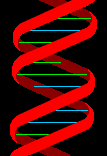Man-Made Lifeforms: One Step Closer
January 25, 2008 - Make sure you like EcoJoes on Facebook to stay updated on green ways to save money and help the environment. Just click the "like" button below. Muchas gracias!
 Yesterday, scientists announced that they had successfully achieved a man-made genome by putting together the DNA of one of the simplest bacteria, Mycoplasma genitalium. Many experts hail this as a huge step on the way toward routine genetic synthesis, with many medical and ecological applications.
Yesterday, scientists announced that they had successfully achieved a man-made genome by putting together the DNA of one of the simplest bacteria, Mycoplasma genitalium. Many experts hail this as a huge step on the way toward routine genetic synthesis, with many medical and ecological applications.
The last step for the scientists is to take the synthetic genome and successfully insert it into a bacterium where it can take over and produce a viable synthetic cell. If it can do that, then this would mark the first synthetic life-form. How huge would that be?
Genetically altered plants and bacteria could work to clean up pollutants and create fuel for people. They could also be used to treat sewage more effectively, and maybe even used to produce medicines. This is a tremendous leap forward for science, and for humanity; once we can harness the power of genetics, we can vastly improve the world.
True, this technology could also be used for harm, such as creating more powerful bio-weapons, but hopefully the benefits will easily outweigh the negatives. There are so many things this could be used to improve; it’ll be exciting to follow the developments on this story.
 Logging you in...
Logging you in... Loading IntenseDebate Comments...
Loading IntenseDebate Comments...
Jeremy · 882 weeks ago
ecojoe · 882 weeks ago